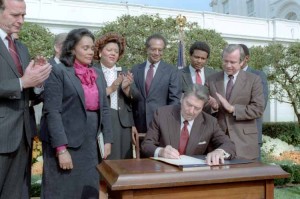This space has annually honored the memory of Martin Luther King Jr. on his designated holiday and we do so again with a holiday related brief collection of articles. In the past we have discussed King’s legacy or simply reproduced his famous speech from the steps of the Lincoln Memorial. This piece will relate a short history of the holiday while Joel Kotkin’s article will reflect on the cities where African-Americans are doing the best economically.
The Martin Luther King Jr. federal holiday first was celebrated in 1986, three years after President Ronald Reagan signed legislation establishing the holiday. Reagan said on the day he signed the bill, “Dr. King had awakened something strong and true, a sense that true justice must be colorblind, and that among white and black Americans, as he put it, “Their destiny is tied up with our destiny, and their freedom is inextricably bound to our freedom; we cannot walk alone.”
 Representative John Conyers, a Democrat from Michigan, introduced the original bill seeking a holiday commemorating the life and works of Dr. King. The bill in the senate was co-sponsored by Senator Edward Brooke of Massachusetts, a Republican (who recently passed away at the age of 95.)
Representative John Conyers, a Democrat from Michigan, introduced the original bill seeking a holiday commemorating the life and works of Dr. King. The bill in the senate was co-sponsored by Senator Edward Brooke of Massachusetts, a Republican (who recently passed away at the age of 95.)
When the Conyers bill reached the House floor in 1979 it was defeated by five votes.
Six million signatures were gathered on petitions to Congress in support of the law. A newly introduced bill by Indiana representative Katie Hall finally passed the House of Representatives in 1983 by a 338 to 90 vote. The holiday bill sponsored by Massachusetts Senator Ted Kennedy passed the Senate two months later, 78-22.
Not all the states adopted the King holiday at first after President Reagan signed it into law. Some states found other names to designate the holiday such as Human Rights Day or Civil Right Day.
The battle over adopting the King holiday in Arizona made national news. Despite the holiday being established first by executive order then rescinded and the legislature adopting the holiday, an overwhelming vote by Arizona citizens rejected the holiday. This action caused the National Football League to move a scheduled Super Bowl from Arizona to Pasadena. In 1992, Arizona voters reversed action and supported the King holiday in another ballot referendum.
In 1999, New Hampshire changed the name of the holiday from Civil Rights Day to Martin Luther King Day, making the New England state the last state to have a holiday named after Dr. King. A year later, South Carolina became the last state to authorize the King holiday as an official holiday for state workers.

